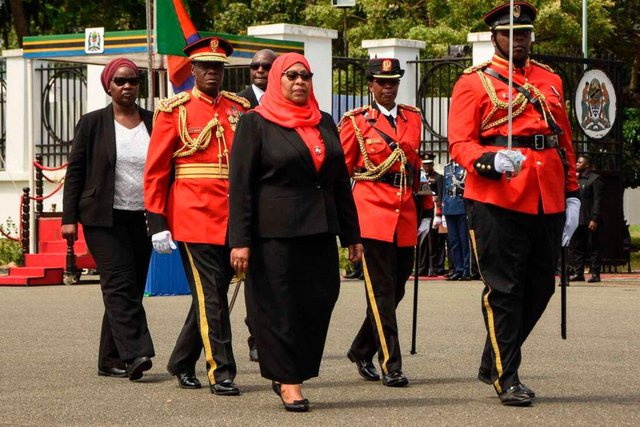President Suluhu charts new path on Covid, media

https://mawazowritingafrica.com/kenya/president-suluhu-charts-new-path-on-covid-media/
Yesterday, President Suluhu announced plans to form an advisory committee to devise a new Covid-19 response strategy and a framework for cooperation with the international community on how to fight the pandemic.
She also unbanned media platforms that had been shut based on controversial laws passed since 2017. Her decision on Covid-19 was a dramatic about-turn on Dr Magufuli’s rigid stance, who stubbornly refused to acknowledge the disease.
“We cannot continue to bury our heads in the sand. I shall form a committee of experts to look at it professionally and then advise the government. It should not be silenced or rejected or accepted without professional research,” President Suluhu told an audience of new senior government officials— including ministers who had taken an oath of office in Dar es Salaam.
Aware that the event was being televised across the region, she acknowledged that the country’s policy had isolated it from the rest of the world.
“We cannot isolate ourselves as if we are an island. That is not to say we can accept everything brought to us, (but) we cannot continue reading about Covid-19 globally, yet (our) policy remains incomprehensible.”
Tanzania’s stance on Covid-19 had baffled the world. While many countries insisted on wearing masks in public spaces, washing hands and keeping distance, Tanzania did not make it compulsory, and sometimes those wearing masks were chided.
Infections and deaths
It failed to publish data on infections, deaths or recoveries, and did not buy vaccines. In February, the World Health Organisation pleaded with Dr Magufuli to relax the rules.
“This situation remains very concerning,” wrote WHO Director-General Tedros Adhanom.
“I renew my call for Tanzania to start reporting Covid-19 cases and share data. I also call on Tanzania to implement the public health measures that we know work in breaking the chains of transmission, and to prepare for vaccination.”
Policy laxity, WHO argued, had meant that many Tanzanians travelling abroad unchecked were recording positive cases at their arrival ports, forcing neighbours like Kenya to tighten surveillance.
Kenya has said it will not shut down the border with Tanzania, but arrivals must have a negative test to be allowed in.
But even as she made the pronouncements, there was still laxity in the air. Neither she nor her audience wore masks. They didn’t keep their distance during the mass swearing-in either.
Sanitation, face masks and physical distance are the three crucial guidelines provided by the WHO to fight Covid-19.
The decision on Covid-19 did not come as a surprise, especially after some of Magufuli’s old friends started changing tune.
Media freedom
“Tanzania cannot exist without science,” argued Mr Hamis Kigwangalla, an MP who was in Dr Magufuli’s first Cabinet.
For Prof Mark Mwandusya, a Kikwete-era minister, Covid-19 was a non- issue until it forced him to spend weeks at Nairobi Hospital.
“No one in the world is safe until all of us are safe,” Prof Mwandosya said yesterday, an about-turn on his previous views .
On media freedom, President Suluhu’s decision had a caveat:“You should lift the ban but tell them to follow the law.”
In a series of laws passed in Magufuli’s first term, a number of media houses were shut or suspended after reporting on stories the government did not like.
They included The Citizen and Mwananchi newspapers under the Nation Media Group stable, which were suspended at various times.
Others were Kwanza TV and Mtetezi TV, whose licences were revoked. Tanzania Daima, Mawio and Manahalisi newspapers were shut for ‘violating’ the terms of their licences.